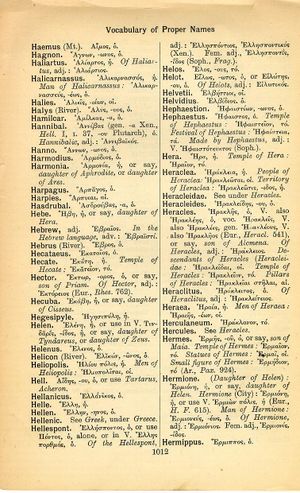Herculaneum: Difference between revisions
Οὐ γὰρ ἀργίας ὤνιον ἡ ὑγίεια καὶ ἀπραξίας, ἅ γε δὴ μέγιστα κακῶν ταῖς νόσοις πρόσεστι, καὶ οὐδὲν διαφέρει τοῦ τὰ ὄμματα τῷ μὴ διαβλέπειν καὶ τὴν φωνὴν τῷ μὴ φθέγγεσθαι φυλάττοντος ὁ τὴν ὑγίειαν ἀχρηστίᾳ καὶ ἡσυχίᾳ σῴζειν οἰόμενος → For health is not to be purchased by idleness and inactivity, which are the greatest evils attendant on sickness, and the man who thinks to conserve his health by uselessness and ease does not differ from him who guards his eyes by not seeing, and his voice by not speaking
(6_7) |
|||
| Line 3: | Line 3: | ||
}} | }} | ||
{{Lewis | {{Lewis | ||
|lshtext=<b>Hercŭlānĕum</b>: (Hercŭlānĭum, Plin. 3, 5, 9, § 62; [[but]] the [[modern]] form Herculanum is not Lat.; in Cic. Att. 7, 3, 1, [[read]] [[Aeculanum]]; v. Orell. ad loc.), ĕi, n., = Ἡράκλειον,<br /><b>I</b> a [[town]] of [[Campania]], [[situated]] on the [[sea]]-[[coast]], [[between]] [[Naples]] and [[Pompeii]], and buried [[along]] [[with]] the [[latter]] [[city]] by an [[eruption]] of [[Vesuvius]], A. D. 79, Mel. 2, 4, 9; Plin. 3, 5, 9, § 62; Sisenn. ap. Non. 207, 9; Liv. 10, 45; Vell. 2, 16, 2; Sen. Q. N. 6, 26 fin.; Flor. 1, 16.—<br /><b>II</b> Derivv.<br /> <b>A</b> Her-cŭlānĕus (-lanus), a, um, adj., of or belonging to [[Herculaneum]], Herculanean: via, Cic. Agr. 2, 14, 36; Plin. 15, 18, 18, § 72; Cloat. ap. Macr. S. 2, 16.—Form [[Herculanus]]: [[ficus]], [[Cato]], R. R. 8, 1: via, Flor. 4, 8, 6.—<br /> <b>B</b> Hercŭlānensis, e, adj., the [[same]]: [[fundus]], Cic. Fam. 9, 25, 3; for [[which]] absol.: [[villa]] in Herculanensi, in the [[vicinity]] of [[Herculaneum]], Sen. de Ira, 3, 22. —Subst.: Hercŭlānenses, ĭum, m. | |lshtext=<b>Hercŭlānĕum</b>: (Hercŭlānĭum, Plin. 3, 5, 9, § 62; [[but]] the [[modern]] form Herculanum is not Lat.; in Cic. Att. 7, 3, 1, [[read]] [[Aeculanum]]; v. Orell. ad loc.), ĕi, n., = Ἡράκλειον,<br /><b>I</b> a [[town]] of [[Campania]], [[situated]] on the [[sea]]-[[coast]], [[between]] [[Naples]] and [[Pompeii]], and buried [[along]] [[with]] the [[latter]] [[city]] by an [[eruption]] of [[Vesuvius]], A. D. 79, Mel. 2, 4, 9; Plin. 3, 5, 9, § 62; Sisenn. ap. Non. 207, 9; Liv. 10, 45; Vell. 2, 16, 2; Sen. Q. N. 6, 26 fin.; Flor. 1, 16.—<br /><b>II</b> Derivv.<br /> <b>A</b> Her-cŭlānĕus (-lanus), a, um, adj., of or belonging to [[Herculaneum]], Herculanean: via, Cic. Agr. 2, 14, 36; Plin. 15, 18, 18, § 72; Cloat. ap. Macr. S. 2, 16.—Form [[Herculanus]]: [[ficus]], [[Cato]], R. R. 8, 1: via, Flor. 4, 8, 6.—<br /> <b>B</b> Hercŭlānensis, e, adj., the [[same]]: [[fundus]], Cic. Fam. 9, 25, 3; for [[which]] absol.: [[villa]] in Herculanensi, in the [[vicinity]] of [[Herculaneum]], Sen. de Ira, 3, 22. —Subst.: Hercŭlānenses, ĭum, m. plur., the inhabitants of [[Herculaneum]], Herculaneans, Inscr. Grut. 439, 6. | ||
}} | }} | ||
Revision as of 09:23, 13 August 2017
English > Greek (Woodhouse)
Ἡράκλανον, τό.
Latin > English (Lewis & Short)
Hercŭlānĕum: (Hercŭlānĭum, Plin. 3, 5, 9, § 62; but the modern form Herculanum is not Lat.; in Cic. Att. 7, 3, 1, read Aeculanum; v. Orell. ad loc.), ĕi, n., = Ἡράκλειον,
I a town of Campania, situated on the sea-coast, between Naples and Pompeii, and buried along with the latter city by an eruption of Vesuvius, A. D. 79, Mel. 2, 4, 9; Plin. 3, 5, 9, § 62; Sisenn. ap. Non. 207, 9; Liv. 10, 45; Vell. 2, 16, 2; Sen. Q. N. 6, 26 fin.; Flor. 1, 16.—
II Derivv.
A Her-cŭlānĕus (-lanus), a, um, adj., of or belonging to Herculaneum, Herculanean: via, Cic. Agr. 2, 14, 36; Plin. 15, 18, 18, § 72; Cloat. ap. Macr. S. 2, 16.—Form Herculanus: ficus, Cato, R. R. 8, 1: via, Flor. 4, 8, 6.—
B Hercŭlānensis, e, adj., the same: fundus, Cic. Fam. 9, 25, 3; for which absol.: villa in Herculanensi, in the vicinity of Herculaneum, Sen. de Ira, 3, 22. —Subst.: Hercŭlānenses, ĭum, m. plur., the inhabitants of Herculaneum, Herculaneans, Inscr. Grut. 439, 6.

